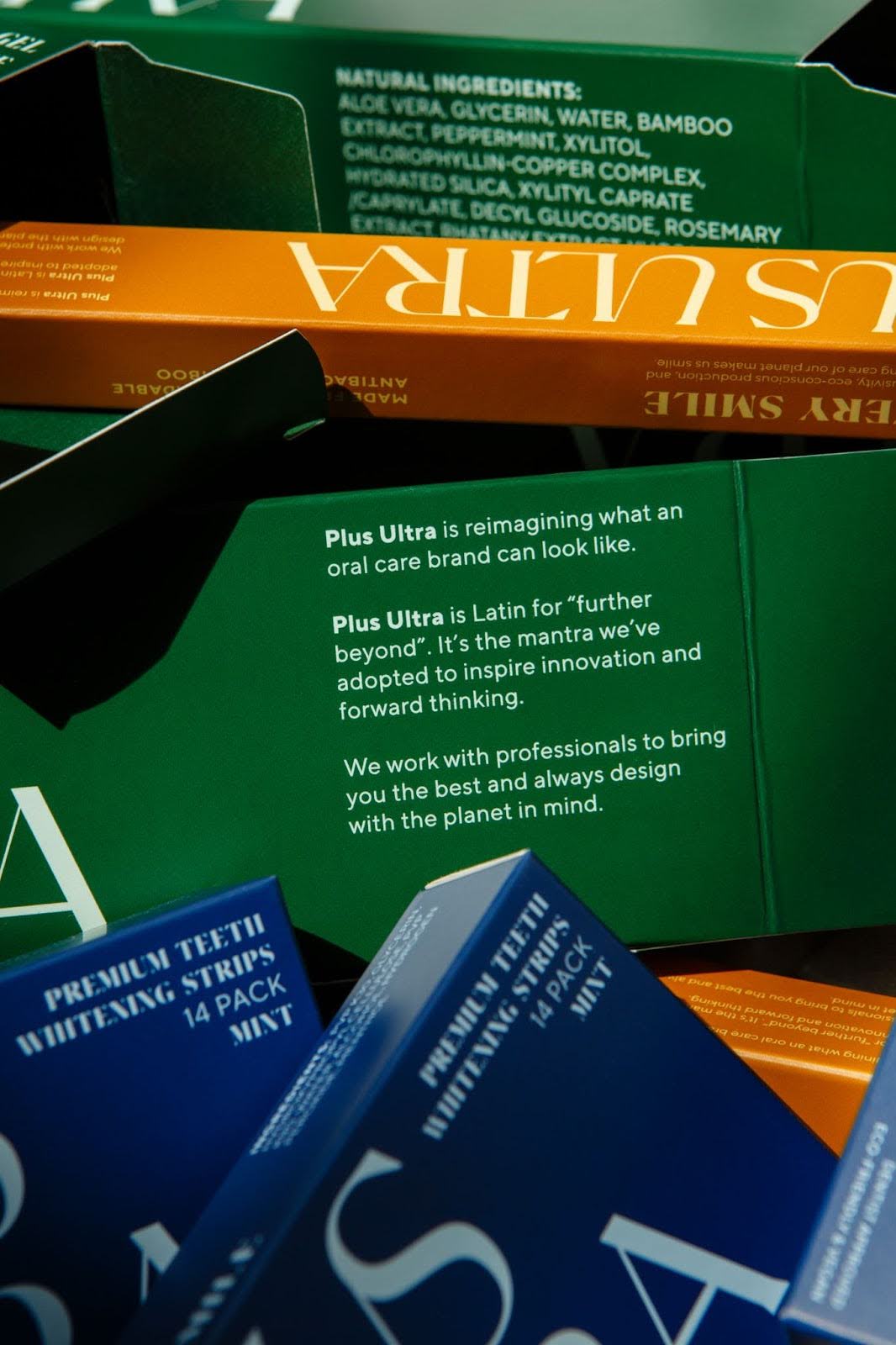Key Takeaways:
- Cost-Effectiveness Over Time: While bamboo toothbrushes may have a slightly higher upfront cost than plastic ones, their durability and the less frequent need for replacement make them a cost-effective choice in the long run.
- Health And Safety: Bamboo toothbrushes are safe and effective for oral hygiene. They have natural antibacterial properties and are free from harmful chemicals.
- Ease Of Adoption: Switching to Plus Ultra’s Bamboo Toothbrushes is an easy, impactful step towards a more sustainable lifestyle without compromising dental care quality.
Comparing Bamboo Toothbrushes To Plastic
When it comes to bamboo toothbrushes versus plastic toothbrushes, there are several key differences to consider:
Production Process
Making bamboo toothbrushes is better for the environment, whereas creating plastic toothbrushes uses more energy in production, as well as petroleum run machines that contribute to global warming.
Oral Health And Usage
Both bamboo and plastic toothbrushes are effective for cleaning. Bamboo has natural antimicrobial properties that help inhibit bacterial growth on the handle.
Cost And Accessibility
Bamboo toothbrushes may initially seem more expensive, but their benefits and longevity justify the cost. They are increasingly available in stores and online. Better for you and better for our planet!
Aesthetic And Feel
Bamboo toothbrushes have a natural, minimalist look and a lightweight feel, while plastic toothbrushes have a smooth texture.
Bamboo toothbrushes offer a sustainable alternative to plastic, with a lower impact and comparable oral hygiene benefits.
Bamboo Toothbrush: The Benefits For Oral Health
Switching to a bamboo toothbrush offers several benefits for oral health and more. Here are the key advantages:
- Natural Antimicrobial Properties: Bamboo has natural antimicrobial properties that reduce bacterial accumulation on the toothbrush handle. Combining it with Plus Ultra’s Natural Toothpaste creates the perfect pair.
- Gentle On Gums: Bamboo toothbrushes usually have soft to medium bristles, which dentists recommend to prevent gum recession and enamel erosion. They are suitable for sensitive gums and reduce gum disease and discomfort.
- Effective Plaque Removal: Despite being gentle, bamboo toothbrush bristles remove plaque and debris as effectively as plastic brushes, preventing cavities and bad breath.

Design And Ergonomics Of Bamboo Toothbrushes
The design and ergonomics of bamboo toothbrushes have evolved significantly, focusing on user comfort and efficiency. Unlike traditional toothbrushes, bamboo toothbrushes are designed with aesthetics and functionality, offering an enjoyable and effective user experience.
Handle Design
The handles of bamboo toothbrushes are carefully crafted to fit comfortably in the hand, providing a secure grip during brushing. Unlike the sometimes slippery plastic handles, bamboo presents a naturally tactile surface that reduces the likelihood of the brush slipping out of your hand, even when wet.
Bristle Innovation
Manufacturers of bamboo toothbrushes are continually innovating in bristle technology to match or surpass the cleaning efficiency of traditional brushes. Bamboo toothbrushes can feature bristles infused with charcoal.
Lightweight And Travel-Friendly
Bamboo toothbrushes are inherently lightweight, making them an ideal choice for travel. Their compact and efficient design takes up minimal space, allowing for easy packing without the risk of damage. The natural durability of bamboo ensures that the toothbrush remains intact.
The Lifespan Of A Bamboo Toothbrush
Understanding the lifespan of a bamboo toothbrush is crucial for consumers looking to make a sustainable choice without compromising their oral health. Generally, the lifespan of a bamboo toothbrush mirrors that of its plastic counterparts; dental professionals recommend replacing any toothbrush every 3 to 4 months or sooner if the bristles become frayed.
Maintaining Your Bamboo Toothbrush
To maximize the lifespan of your bamboo toothbrush’s lifespan, rinse it thoroughly after each use, removing all toothpaste and debris. Shaking it dry and storing it in an upright position, preferably in a well-ventilated area, will help prevent moisture accumulation, which could otherwise lead to premature degradation of the bamboo handle. Unlike plastic, bamboo can be affected by excessive moisture, so keeping it dry extends its usable life.
Signs It's Time To Replace
Knowing when it’s time to replace your bamboo toothbrush is straightforward. The most apparent sign is the state of the bristles. If they start to fray, bend, or become discolored, it’s time for a new one. Even if the bristles seem in good condition after several months, the efficacy in cleaning may be reduced, and replacing the toothbrush is advisable. If you’ve kept your toothbrush in a place where the handle could absorb moisture, the tip of the handle will become dark. If that happens, it’s time to change your toothbrush!
Disposal Considerations
The bamboo handle is compostable, breaking down naturally without leaving harmful waste. However, before composting, bristles should be removed, as nylon bristles aren't biodegradable like the handle. Some bamboo toothbrushes come with biodegradable bristles.

Final Thoughts
Switching to a bamboo toothbrush is a small but powerful step towards sustainability. Bamboo toothbrushes reduce plastic waste and have benefits for oral health. They are designed for comfort and customization, making them a great option for conscious consumers.
Check out the Plus Ultra Travel Kit – great for at home or on the go!
Read Also:
- Should You Brush Your Teeth After Using Whitening Strips?
- Swap Out Your Toothbrush Now: A Guide To Optimal Toothbrush Hygiene
- How Often Should An Electric Toothbrush Head Be Replaced?
Frequently Asked Questions
What is a bamboo toothbrush made of?
Bamboo toothbrushes are primarily made from bamboo, a rapidly renewable resource, for their handles. The bristles are often made from nylon, although biodegradable options such as boar bristles or plant-based materials are available.
How long does a bamboo toothbrush last?
A bamboo toothbrush typically lasts as long as traditional plastic toothbrushes, about 3-4 months with proper care.
Can bamboo toothbrushes be recycled?
Bamboo toothbrush handles are biodegradable and can compost over time. However, the bristles, often made from nylon, must be removed and disposed of separately as they are not biodegradable.
Are bamboo toothbrushes antibacterial?
Bamboo has natural antibacterial properties, which may help reduce bacterial growth on the handle. However, the bristles may not have antibacterial properties, and it's important to rinse and dry your toothbrush properly to keep it clean.
Can bamboo toothbrushes be composted?
Yes, the bamboo handle of the toothbrush can be composted. Before composting, you must remove the bristles and any non-biodegradable parts.
How do I dispose of my bamboo toothbrush properly?
To properly dispose of your bamboo toothbrush, remove the nylon bristles with pliers and recycle them if possible. The bamboo handle can be composted, repurposed, or placed in the regular trash, which will biodegrade over time.
What are the benefits of switching to a bamboo toothbrush?
Switching to a bamboo toothbrush can reduce plastic waste, as bamboo is a sustainable and biodegradable material.


